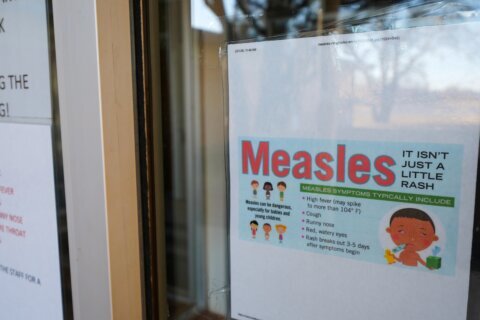Catherine Hoggle blacked out in a cafeteria line at Clifton T. Perkins Hospital, where she is being treated with a “last resort” antipsychotic medication, as Montgomery County, Maryland, prosecutors near a five-year deadline that could affect their ability to try Hoggle for murdering her children.
Sarah, 3, and Jacob Hoggle, 2, disappeared almost five years ago, in September 2014. Their mother was the last person known to have seen them.
In a motion made public Friday, State’s Attorney John McCarthy requested a delay until December for Hoggle’s next competency hearing, acknowledging a psychiatrist selected by prosecutors reached a similar conclusion to one rendered repeatedly over four years by doctors at Perkins — “Ms. Hoggle is not currently competent to stand trial and remains dangerous.”
In July, McCarthy and co-counsel Ryan Wechsler were granted the opportunity to seek a second opinion, and selected Dr. Christiane Tellefsen, the former director of Perkins, to evaluate Hoggle.
Prosecutors have been critical of the previous evaluations by Dr. Danielle Robinson, of Perkins, calling them “substandard” — an opinion not shared by Circuit Court Judge Robert Greenberg, who said he wanted “another set of eyes,” and authorized the second opinion evaluation.
Tellefsen’s report is sealed — as are all documents related to Hoggle’s treatment for paranoid schizophrenia.
McCarthy’s motion disclosed more details about Hoggle’s illness, drug regimen, and chances of restorability than have been made public in previous court documents.
McCarthy said Hoggle is in the midst of a medical trial of the drug Clozapine, which the state’s attorney said “is generally considered a last resort.”
According to The National Institutes of Health: “Clozapine is used to treat the symptoms of schizophrenia (a mental illness that causes disturbed or unusual thinking, loss of interest in life, and strong or inappropriate emotions) in patients who have not been helped by other medications or who have tried to kill themselves and are likely to try to kill or harm themselves again.”
McCarthy said Tellefsen’s report states “the defendant has been partially responsive to Clozapine,” but is not yet taking a high enough dosage to fully restore Hoggle. “The defendant is closer to competency than she has been in prior years.”
“It’s unclear what records the state is referring to, other than the report from their hand-picked expert,” Hoggle’s attorney David Felsen told WTOP. “I don’t agree with Mr. McCarthy’s characterization of Dr. Tellefsen’s report — the report will speak for itself.”
Asked why prosecutors disclosed details of Hoggle’s treatment in a public motion, McCarthy’s spokesman Ramon Korionoff told WTOP: “It is important for the judge in the matter to know the specific course of treatment for this defendant, because it is the basis of the request for delay and continuance of the court proceedings.”
According to McCarthy: “The defendant has not reached the maximum dose of Clozapine and the rate of dose titration upward has been limited by the patient’s complaint of side effects.”
McCarthy’s motion acknowledges Clozapine carries a wide variety of side effects, “including but not limited to weight gain, blood pressure problems, lower heart rate, and cardiomyopathy.”
Mayo Clinic online resources say: “Cardiomyopathy is a disease of the heart muscle that makes it harder for your heart to pump blood to the rest of your body.”
Sources familiar with Hoggle’s treatment confirmed she had blacked out in the early days of her treatment with Clozapine, although it is not clear why. Patients often experience fewer side effects to the drug, as their bodies become accustomed to it.
Prosecutors have said they believe Hoggle is feigning mental illness to avoid prosecution.
Korionoff was asked if Hoggle was being forced to accept more medication than she felt comfortable taking, in an effort to have her well-enough to stand trial: “I’m not in a position to answer this question, since I’m not a medical professional, nor would I discuss Dr. Tellefsen’s course of treatment.”
In his motion, McCarthy said Hoggle was previously treated with Clozapine during a prior hospitalization. “The medication worked in that instance and the defendant was released back into the community.”
Given Hoggle’s previous experiences with Clozapine, her attorney, Felsen, was asked if the treatment is continued, and the dosage increased, whether it would ensure his client would be found competent to stand trial.
“Absolutely not. No prior hospitalizations dealt with the issue of legal competency,” said Felsen.
He added, “We are aware of the very profound and dangerous side effects caused by the current treatment regimen. As we stated in previous hearings, Ms. Hoggle has been compliant with all requests from the doctors at Perkins.”
As with many drugs used to treat mental illnesses, doctors say clozapine is best tolerated if introduced in lower dosages, and gradually increased.
“The transition to full dosage on Clozapine is a slow complex process and full dosage units cannot be obtained for a few more months,” McCarthy wrote. “Dr. Tellefsen would then return to reevaluate the defendant’s mental state and provide a final opinion on the issue of competency to stand trial.”
Felsen said he would oppose that plan.
“That would require another evaluation, which wasn’t specified in the judge’s order,” Felsen said.
While the judge’s order said Tellefsen “is hereby permitted to examine any and all appropriate interviews of Defendant Catherine Hoggle,” it also specifies Tellefsen’s report must be filed with the court by Aug. 15.
“It is the judge’s prerogative to determine any further actions by medical staff and personnel in order to assist his determination of competency to stand trial,” Korionoff said.
In addition to Tellefsen’s report, Greenberg ordered Perkins’ Robinson to prepare a separate competency evaluation, due by the same date. Felsen and Korionoff said they had not received Robinson’s conclusions yet.
As WTOP reported in May, Troy Turner, the father of Sarah, Jacob, and an older child with Hoggle, has expressed concern about an upcoming Maryland deadline that requires felony charges be dropped against a person found not competent to stand trial for five years. No motion has been filed seeking a dismissal, and the exact deadline is not clear, according to attorneys on both sides.
Regardless, even if murder charges were to be dropped against Hoggle, she would almost certainly be involuntarily civilly committed to an institution, since her two children have never been found.
Hoggle’s next court date has not been established.








